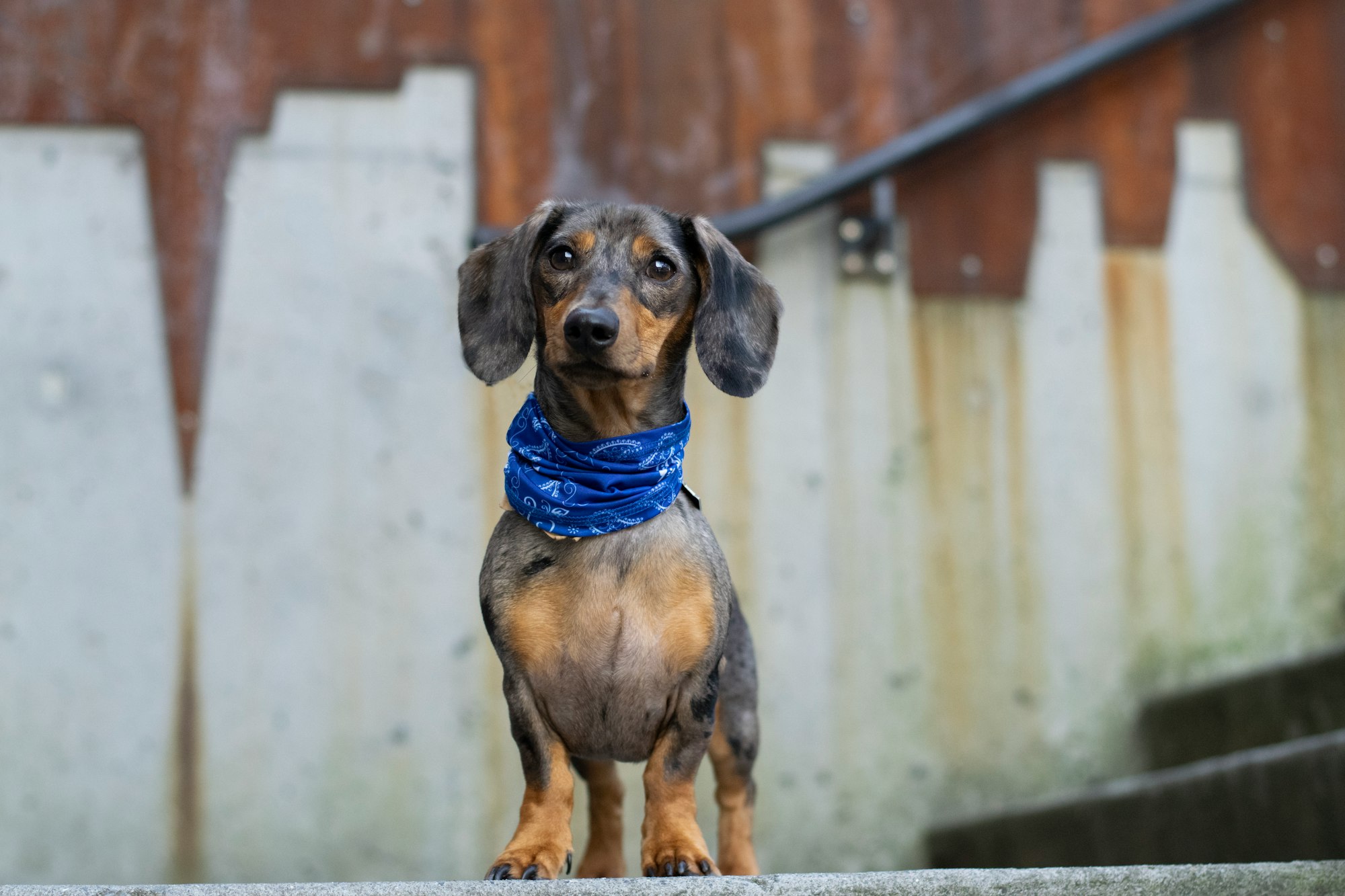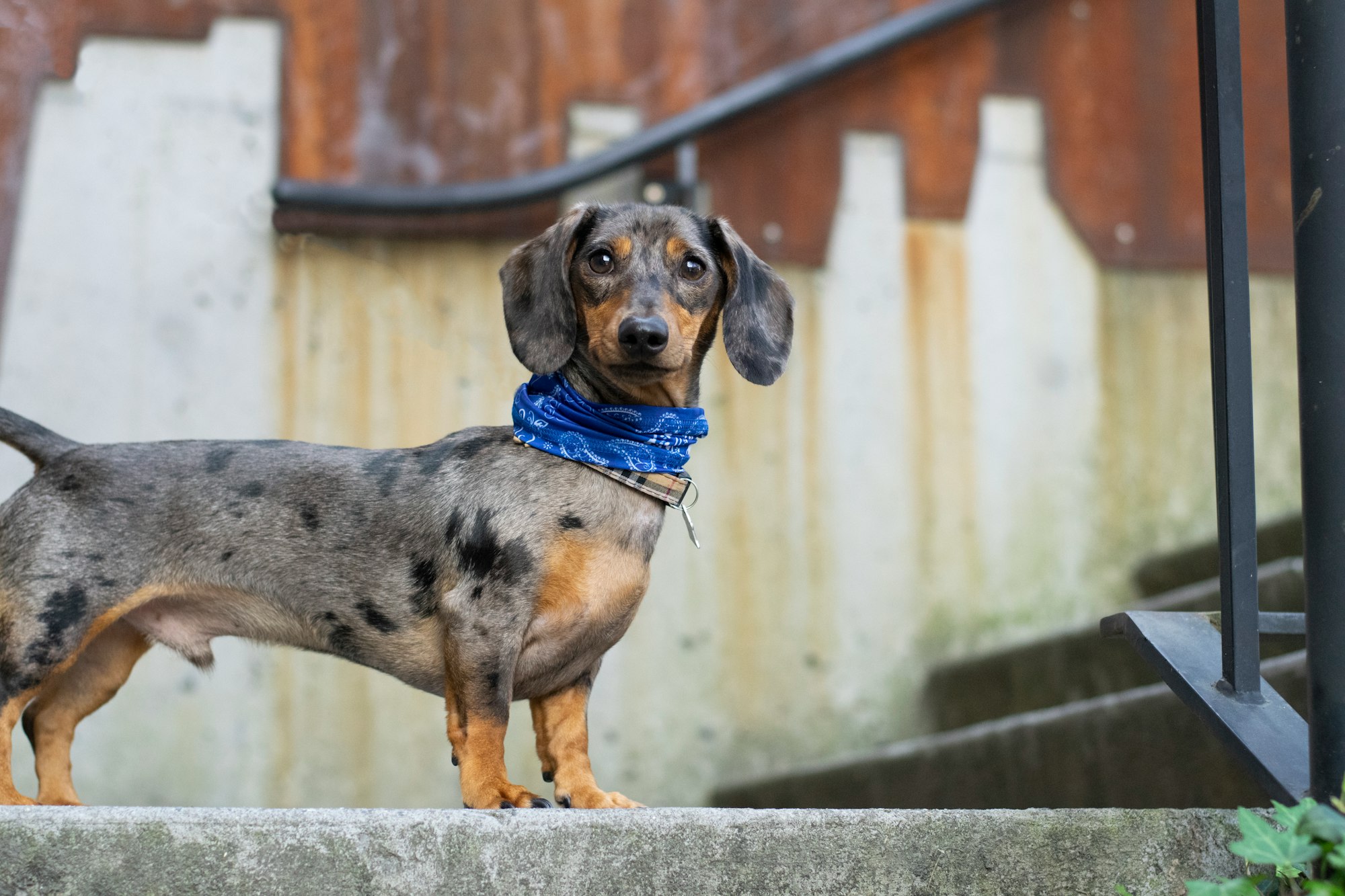The Merle Dachshund is a captivating variation of the well-loved Dachshund breed. With its distinct coat pattern and charming personality, this breed has gained popularity among dog enthusiasts. Here, we will explore the fascinating aspects of Merle Dachshunds, including their genetics, appearance, temperament, and considerations for potential owners.
The Merle Dachshund is a type of Dachshund with a unique dog coat color pattern characterized by a mottled or marbled effect. This breed is known for its striking appearance and captivating colors, which can range from blue, red, chocolate, and even lilac. Merle Dachshunds have become increasingly popular in recent years due to their distinct coat and charming personality.

Origins and Breeding of Merle Dachshunds
The captivating Merle Dachshund breed has a fascinating history and unique breeding considerations. In this section, we will delve into the origins of Merle Dachshunds and explore the breeding practices associated with this beautiful and distinctive variation.
1. Origins of Merle Dachshunds: The Merle Dachshund, with its striking coat pattern, traces its roots back to the parent breed, the Dachshund. Dachshunds originated in Germany and were initially bred for hunting purposes, particularly for tracking and flushing out burrow-dwelling animals like badgers.
The Merle coat pattern, however, is not native to the Dachshund breed. It is believed that the Merle gene was introduced through crossbreeding with other breeds such as the Australian Shepherd or the Border Collie. These breeds are known to carry the Merle gene, and its introduction into the Dachshund lineage resulted in the emergence of Merle Dachshunds.
2. Breeding Considerations: Breeding Merle Dachshunds requires careful consideration and responsible practices to maintain the health and well-being of the breed. It is important to note that not all Dachshunds carry the Merle gene, and specific breeding strategies must be implemented to produce Merle offspring.
To breed Merle Dachshunds ethically, it is crucial to avoid Merle-to-Merle breeding. Breeding two Merle Dachshunds together can result in a higher risk of genetic abnormalities and health issues in the offspring. This breeding practice is generally discouraged due to the potential risks associated with the Merle gene.
Responsible breeders follow a controlled breeding program that ensures genetic diversity and reduces the risk of inherited health problems. By selectively breeding Merle Dachshunds with non-Merle Dachshunds, breeders can produce healthy Merle offspring while minimizing the risk of genetic issues.
Merle Gene and Coat Color
The Merle gene is responsible for the distinctive coat coloration seen in Merle Dachshunds. This gene creates a random dilution of pigment in the fur, resulting in a marbled or mottled pattern. The intensity and variation of the Merle coat can differ greatly from dog to dog.
Merle Dachshunds can have a variety of coat colors and patterns. Some common variations include blue Merle, red Merle, chocolate Merle, and lilac Merle. Each coat variation possesses its unique beauty, making Merle Dachshunds highly sought after by dog lovers.

Temperament and Personality
Understanding their temperament is essential for potential owners to ensure a compatible match and a harmonious relationship with this delightful breed. Let's explore the typical temperament and personality characteristics of Merle Dachshunds.
1. Loyal and Affectionate: Merle Dachshunds are renowned for their unwavering loyalty and deep affection for their owners. They form strong bonds with their families and thrive on human companionship. Expect your Merle Dachshund to shower you with love and be a devoted companion.
2. Intelligent and Clever: Merle Dachshunds are intelligent and quick-witted dogs. They possess a keen sense of curiosity and enjoy mental stimulation. This intelligence can make training a rewarding and enjoyable experience, as they are eager to learn and please their owners.
3. Tenacious and Courageous: Originally bred as hunting dogs, Dachshunds, including Merle Dachshunds, have a tenacious and courageous nature. They possess a strong prey drive and were traditionally used to track and flush out burrow-dwelling animals. This instinct may manifest in their behavior, as they can be determined and focused when pursuing scents or objects of interest.
4. Playful and Energetic: Merle Dachshunds have a playful and energetic nature. They enjoy engaging in activities that stimulate both their mind and body. Regular exercise and interactive play sessions are crucial to keep them physically and mentally satisfied, as they have bursts of energy that need to be expended.
5. Alert and Watchful: Merle Dachshunds make excellent watchdogs due to their alert and watchful nature. They have a tendency to be attentive and vocal, alerting their owners to any potential intruders or unusual occurrences. Their keen senses and sharp barks make them excellent alarm systems.
6. Independent and Strong-Willed: Merle Dachshunds have a streak of independence and can be quite strong-willed at times. This independent nature may manifest in their behavior, making training a bit more challenging. Consistent and positive reinforcement-based training methods, coupled with patience and understanding, can help guide their independent spirits.
7. Good with Families: Merle Dachshunds are generally good with families, including children. However, as with any dog breed, it's essential to supervise interactions between the dog and young children to ensure everyone's safety. Early socialization and gentle introductions to new experiences can help them develop positive associations and become well-rounded as good family dogs.
Understanding the temperament and personality traits of Merle Dachshunds is crucial for potential owners. Their loyalty, intelligence, playfulness, and independent nature make them delightful companions for individuals and families who can provide them with the love, care, and mental stimulation they need to thrive.
Remember, individual temperament can vary within the breed, so it's critical to spend time with a Merle Dachshund and communicate with reputable breeders to ensure the right match for your lifestyle and preferences.
Health Concerns and Ethical Considerations
While Merle Dachshunds are undeniably beautiful, it's essential to be aware of potential health concerns associated with the Merle gene. Merle-to-merle breeding can lead to a higher risk of genetic abnormalities and health issues.
Responsible breeders take extra precautions to ensure the well-being of their Merle Dachshund litters and prioritize the health and welfare of the breed. When considering a Merle Dachshund as a pet, it's crucial to seek out reputable breeders who prioritize responsible breeding practices. This includes genetic testing, health screenings, and avoiding Merle-to-merle breeding. By doing so, you can minimize the risk of inheriting potential health problems associated with the Merle gene.

Training and Socialization
Training and socialization are vital for any dog breed, including Merle Dachshunds. While Dachshunds, in general, are intelligent and trainable, Merle Dachshunds may present unique training challenges due to their strong-willed nature.
Early socialization is particularly important for Merle Dachshunds to ensure they develop into well-rounded and friendly companions. Exposing them to different environments, people, and other animals from an early age will help prevent behavioral issues in the future.
Care and Grooming
Merle Dachshunds require regular grooming to maintain their coat's beauty and overall health. The exact grooming needs will depend on the type of Dachshund breed (Long-haired, Smooth-haired, or Wire-haired) and the specific coat variation.
Regular brushing, nail trimming, and dental care are essential parts of the grooming routine for Merle Dachshunds. Regular exercise and a well-balanced diet are crucial to maintaining their overall health and weight.
Diet and Nutrition
Proper diet and nutrition play a crucial role in the overall health and well-being of Merle Dachshunds. Providing a well-balanced and appropriate diet is essential to support their growth, maintain a healthy weight, and prevent potential health issues. Here, we will explore the dietary considerations and nutritional needs specific to Merle Dachshunds.
1. High-Quality Dog Food: Feeding your Merle Dachshund a high-quality, commercially prepared dog food is generally recommended. Look for dog foods that are specifically formulated for small-breed dogs or those that meet the nutritional requirements for all life stages. These foods are designed to provide the right balance of nutrients and energy levels suitable for the unique needs of Merle Dachshunds.
2. Protein: Protein is an essential component of a dog's diet, as it supports muscle development and overall growth. Look for dog foods that list quality animal protein sources, such as chicken, turkey, beef, or fish, as the main ingredients. Aim for a diet that provides a moderate amount of protein to meet your Merle Dachshund's needs without excessive amounts.
3. Healthy Fats: Healthy fats are another important element of a balanced diet for Merle Dachshunds. Look for dog foods that contain sources of omega-3 and omega-6 fatty acids, such as fish oil or flaxseed oil. These fatty acids promote healthy skin and coat, support brain function, and contribute to overall well-being.
4. Carbohydrates: Carbohydrates provide a source of energy for dogs. Look for dog foods that include wholesome carbohydrates, such as brown rice, sweet potatoes, or whole grains. These complex carbohydrates provide sustained energy and are generally more beneficial than simple carbohydrates like corn or wheat.
5. Avoiding Overfeeding: Merle Dachshunds are prone to obesity, which can put a strain on their joints and overall health. It's necessary to monitor their food intake and avoid overfeeding. Follow the feeding guidelines provided by the dog food manufacturer and adjust portion sizes based on your individual dog's activity level, age, and metabolism. Regularly check their weight and consult with your veterinarian to ensure they maintain a healthy body condition.
6. Meal Frequency: Merle Dachshunds generally do well with two meals a day, although some may prefer smaller, more frequent meals. Dividing their daily food portion into two meals helps prevent digestive issues and regulates their energy levels throughout the day. Avoid free-feeding or leaving food out all day, as it can contribute to overeating and weight gain.
7. Fresh Water: Ensure your Merle Dachshund has access to fresh, clean water at all times. Hydration is vital for their overall health and helps regulate body temperature and organ function. Monitor their water intake and refill the water bowl regularly.
8. Special Considerations: Merle Dachshunds may have specific dietary considerations based on their individual health needs. If your dog has any food allergies, sensitivities, or underlying health conditions, consult with your veterinarian to determine the most appropriate diet and any necessary dietary modifications.
Remember, each Merle Dachshund is unique, and their nutritional needs may vary.
Merle Dachshunds as Family Pets
Merle Dachshunds can make wonderful family pets for the right households. They are known to form strong bonds with their owners and are generally good with children. However, it's crucial to consider certain factors before bringing a Merle Dachshund into your home.
If you have young children or other pets, it's important to supervise interactions and ensure proper socialization. Additionally, due to their energetic nature, Merle Dachshunds require regular exercise and mental stimulation to prevent boredom and potential behavior problems.

Finding a Merle Dachshund
When looking to add a Merle Dachshund to your family, it's essential to find a reputable breeder or consider adoption from a rescue organization. Reputable breeders will prioritize the health and well-being of their dogs and provide you with the necessary information about the specific Merle Dachshund you are interested in.
Ask the breeder about health clearances, genetic testing, and the breeding practices they follow. If adoption is your preferred route, reach out to Dachshund rescue organizations or local shelters to inquire about any Merle Dachshunds available for adoption.
Conclusion
In conclusion, the Merle Dachshund is a unique and visually captivating breed that has captured the hearts of many dog lovers. With their distinctive coat patterns and charming personalities, Merle Dachshunds can make wonderful companions for individuals and families alike.
When considering Merle Dachshund, it's essential to prioritize responsible breeding practices, health screenings, and early socialization. By doing so, you can ensure the well-being and happiness of your Merle Dachshund throughout its life.
FAQs
1. Q: Are Merle Dachshunds prone to any specific health issues?
A: Merle Dachshunds can be more susceptible to certain health problems, such as hearing and vision issues, as well as potential skin and coat abnormalities.
2. Q: How often should I groom my Merle Dachshund?
A: Regular grooming is essential for a Merle Dachshund, including brushing their coat, cleaning their ears, and trimming their nails. Aim for a grooming routine every 4-6 weeks.
3. Q: Can Merle Dachshunds live in apartments or small homes?
A: Yes, Merle Dachshunds can adapt well to apartment or small home living, as long as they receive regular exercise and mental stimulation.
4. Q: Are Merle Dachshunds good with children?
A: Merle Dachshunds can be great companions for children, but it's important to supervise interactions and teach both the dog and the child how to interact safely and respectfully.
5. Q: How can I find a reputable Merle Dachshund breeder?
A: Look for breeders who prioritize the health and well-being of their dogs, perform health testing, and provide a loving environment for their puppies. Referrals from trusted sources can also be helpful.

